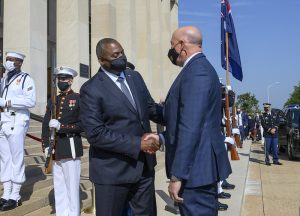Following the announcement of its new trilateral security partnership with the United States and United Kingdom, the Australian government has stepped up its efforts to reassure Southeast Asian neighbors about the implications of the new agreement.
According to a report from the Australian Broadcasting Corporation, Australian Prime Minister Scott Morrison yesterday held a phone call with Indonesia’s President Joko Widodo during which he assured him that AUKUS would not change Australia’s obligations under the nuclear non-proliferation treaty. He also said that the partnership would contribute to the maintenance of a “strategic balance” in the region.
One of the most important and controversial elements of the AUKUS partnership is its plan to equip Australia with a fleet of nuclear-powered submarines. While these boats are unlikely to be ready until the late 2030s at the earliest, the deal has prompted concerns that Australia could use the nuclear propulsion technology to develop a nuclear weapons capability.
On Friday, Indonesia reacted to the announcement by noting that it was “deeply concerned about the continuing arms race and power projection in the region,” while Malaysia’s new prime minister, Ismail Sabri Yaakob, said that the AUKUS pact could “provoke other powers to take more aggressive action in this region, especially in the South China Sea.” He added that it could be a “catalyst for a nuclear arms race in the Indo-Pacific region.”
Not all Southeast Asian governments have been critical of AUKUS. Philippines Foreign Secretary Teodoro Locsin said in a statement today that the Philippines welcomed the deal, arguing that “the enhancement of a near abroad ally’s ability to project power should restore and keep the balance” in the region. “There is an imbalance in the forces available to ASEAN member states, with the main balancer more than half a world away,” Locsin said in the statement. “The enhancement of a near abroad ally’s ability to project power should restore and keep the balance rather than destabilize it.”
Singapore pitched itself somewhere in the middle, expressing its hopes that the deal “would contribute constructively to the peace and stability of the region and complement the regional architecture.”
While the announcement of AUKUS was accompanied by rhetoric about freedom and mentioned no nation by name, the partnership, like the recently revived Quad partnership between Japan, Australia, India, and the U.S., has been motivated squarely by China’s growing power and ambition, including its expansive claims in the South China Sea.
This has put a Southeast Asian nations in an awkward position, given their robust economic ties to China and close security relations with the U.S. and its partners, and is set to strain further their desire to maintain fruitful relations with both.
In addition to fears of an arms race or an open conflict, there is a clear worry in Southeast Asia that the agreement might sideline the Association of Southeast Asian Nations (ASEAN), which, as Dian Septiari of the Jakarta Post noted, “effectively acts as a buffer separating Australia and China” and thus stands to lie at the center of any outbreak of conflict between the two countries. Former Indonesian Foreign Minister Marty Natalegawa put this down to ASEAN’s complacency and recent lack of proactivity, telling the Jakarta Post that AUKUS, like the Quad before it, demonstrated to ASEAN “the cost of its dithering and indecision in the complex and fast-evolving geopolitical environment.”
Other observers seemed to suggest that no matter ASEAN’s actions, its congenital desire to avoid choosing sides between China and the U.S. was always going to resulting in it being bypassed by impatient superpowers.
As James Chin of the University of Tasmania noted in an article yesterday, the AUKUS agreement “reinforces the idea that the opinions of the ASEAN members matter little when it comes to the superpowers and how they operate in the region.” He added, “If anything, the AUKUS move reinforced the widely held perception that Australia’s mantra of being ‘part of the region’ is, in fact, ‘empty talk.’ Australia has firmly signaled its intentions to put its Anglo allies in the U.S. and U.K. first.”
In order to allay such concerns, Will Nankervis, Australia’s ambassador to ASEAN, also issued a statement yesterday declaring that AUKUS “is not a defense alliance or pact” and that the agreement “does not change Australia’s commitment to ASEAN nor our ongoing support for the ASEAN-led regional architecture.” The statement also stresses that Australia has no desire to acquire nuclear weapons.
Whether these Australian efforts succeed in allaying regional concerns remains to be seen. But once the shock of the announcement wears off, it is likely that Southeast Asian nations will learn to live with AUKUS. Despite their concerns about a renewal of superpower conflict, and differences of opinion about the threat posed by China, many of the region’s governments will be pragmatic and seek to turn the agreement, and its eventual stiffening of Australia’s naval deterrent, to their advantage.
Indeed, as Shahriman Lockman, a senior analyst at the Institute of Strategic and International Studies in Malaysia, suggested to Bloomberg, the more negative statements from Southeast Asian nations could be a way of “expressing concern about AUKUS” and underlining the independence of their foreign policies, while they set about establishing beneficial security partnerships with the AUKUS powers and other Western nations.
In this sense, it is entirely possible that the main audience for the recently voiced Southeast Asian concerns was not Washington, Canberra, or London, but Beijing.
































